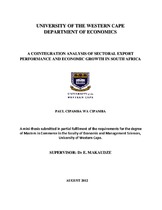A cointegration analysis of sectoral export performance and economic growth in South Africa
Abstract
The objective of this study is to investigate the empirical relationship between exports and economic growth in order to ascertain whether the hypothesis of export-led growth is valid in the case of South Africa. This study has not only focused on sectoral exports for the period 1990-2011; but it has also examined total exports for the period extending from 1970 to 2011. Using quarterly data and time series econometric techniques of co-integration and Granger-causality
tests over the two set of periods, the key findings of the study are as follows:
(i) At the aggregate level (using total exports): the technique of co-integration suggests that total exports and GDP moved together in the long-run, though deviations from the steady state might happen in the short-run. Furthermore, Granger causality tests inferred from the Vector Error Correction model reveal that the direction of causality between export and GDP growth is bidirectional.
(ii) At the sectoral level (using the main component of exports): export-growth link
emerges as a long-run behavioural relationship since a co-integrating relation was found among output and agricultural, manufactured and mining exports. This relationship demonstrates that manufactured exports have the greatest positive impact on output growth. (iii) Sectoral level Granger-causality tests based on ECM reveal the existence of a long run causality running from manufactured exports to GDP; whereas the short-run causality runs from manufactured and mining exports to GDP. However, the Toda-Yamamoto Granger test confirms only short-run causality from manufactured exports to GDP. In both cases, there is evidence of a uni-directional causality from exports to GDP.The above results show that the hypothesis of export-led growth is valid for South Africa. This implies that exports, particularly manufactured and mining exports play a key role in driving economic growth. Hence, the key policy implication of these results is that, measures which aim at stimulating production for exports and shifting the content of exports will meaningfully contribute to the improvement of GDP growth and employment prospects in South Africa.

